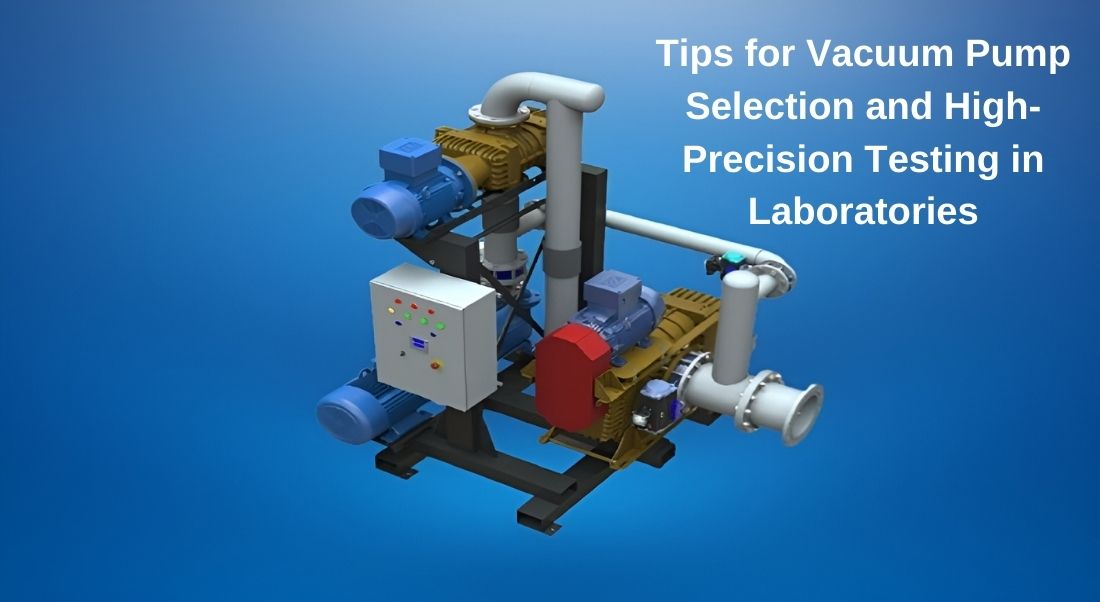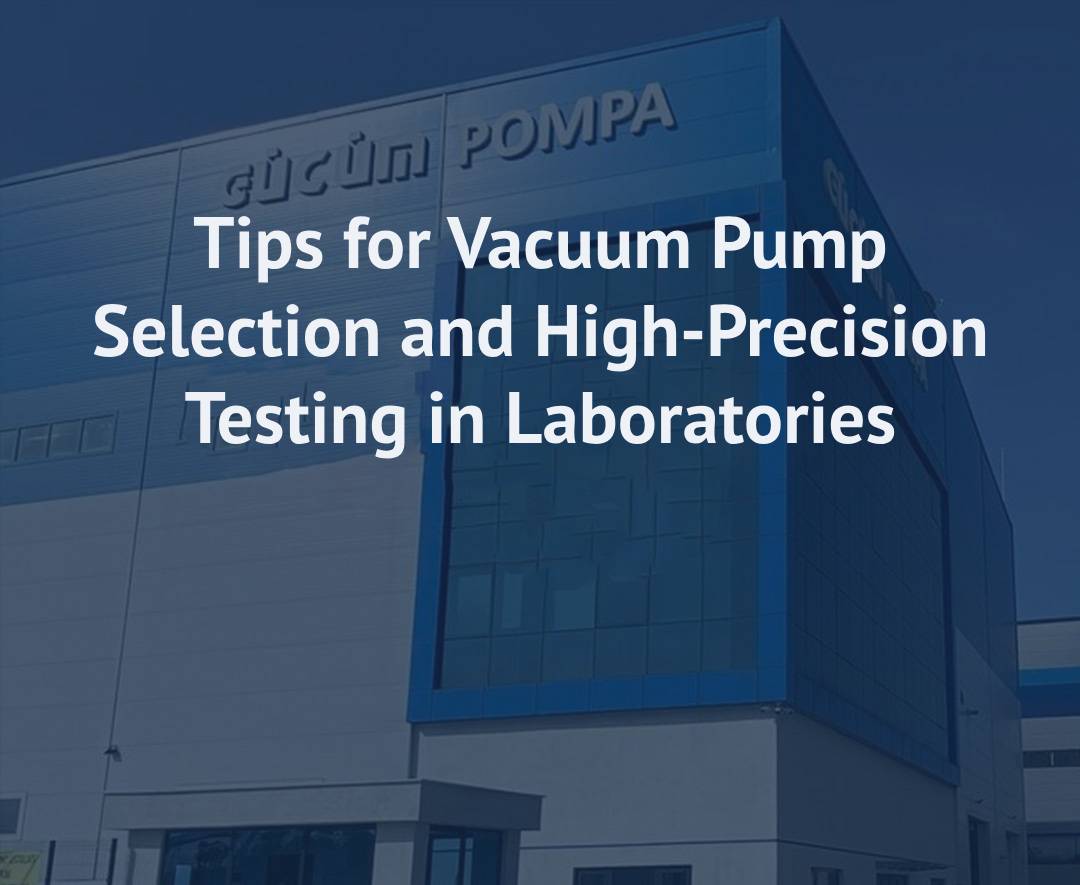Tips for Vacuum Pump Selection and High-Precision Testing in Laboratories
Vacuum Pump Selection in Laboratories and Tips for High-Precision Testing
Laboratories are environments where scientific discoveries and innovations take place, and precision and accurate results are critical. Therefore, the equipment used in these settings plays a significant role in the success of research and testing processes. Vacuum pumps are one of the essential tools used in laboratories. This article will explore how to select vacuum pumps for laboratory use and provide tips on achieving the best results for high-precision tests.
What is a Vacuum Pump and What Does It Do in Laboratories?
A vacuum pump is a device used to create a low-pressure environment (vacuum) by removing air or gases from a specific area. In laboratories, vacuum is commonly used to create the necessary conditions for various tests, analyses, and experiments. Vacuum environments are essential for accelerating certain reactions, removing vapors, or providing specialized conditions for certain processes.
The types of vacuum pumps used in laboratories vary depending on the requirements of the application. Not all vacuum pumps are suitable for every task, so selecting the right pump is crucial for ensuring the accuracy and efficiency of laboratory tests.
Key Factors to Consider When Selecting a Vacuum Pump for Laboratories
Choosing the correct vacuum pump for laboratory use is vital for the success and accuracy of experiments. Here are some important factors to consider when selecting a vacuum pump for laboratory applications:
Required Vacuum Level
Different tests and experiments in laboratories require different vacuum levels. The vacuum level is a key factor in determining the pump's capacity. Some processes may only require low vacuum levels, while others may need high vacuum levels. For example, high-precision experiments such as microelectronics testing or sensitive analyses may require higher vacuum levels.
Type of Pump
Vacuum pumps are typically classified into two main types: oil-sealed and oil-free pumps. Oil-sealed pumps are suitable for lower vacuum levels, while oil-free pumps are preferred for more sensitive tests as they provide a cleaner environment. Oil-free pumps are commonly used in pharmaceutical, biotechnology, and chemical tests. The type of pump chosen should align with the laboratory's specific requirements.
Capacity and Flow Rate
The capacity and flow rate of a vacuum pump determine how much air or gas the pump can remove. In laboratories where rapid vacuum creation is required, high-flow pumps are preferred. However, high-flow pumps can sometimes generate unwanted vibrations or noise, so the noise level should also be considered. Additionally, the capacity of the pump must be chosen according to the volume and type of test being conducted.

Size and Space Considerations
Laboratories often have limited space, so the size of the vacuum pump is an important consideration. The pump should fit comfortably in the available space without causing obstructions. Larger pumps may create issues in confined laboratory environments, so compact and portable models may be preferred.
Maintenance Requirements and Durability
Durability and maintenance requirements are key factors for ensuring long-term performance. Vacuum pumps that are easy to maintain and durable will provide reliable service over time. Regular maintenance can extend the life of the pump and improve its performance. Oil-free pumps generally require less maintenance and can be more convenient for laboratory use.
Noise Level
Vacuum pumps, especially during continuous operation, can generate significant noise. The noise level can affect the laboratory environment, so choosing pumps that operate with lower noise levels is recommended. This is especially important for long-duration testing or experiments that require minimal disruption.
Applications of Vacuum Pumps in Laboratories
Vacuum pumps have a wide range of uses in laboratory settings. Vacuum systems play a critical role in providing the necessary conditions for the success and accuracy of experiments and tests.
Vacuum Filtration
Vacuum filtration is a technique used to separate liquids or gases from a medium that contains particles. In laboratories, vacuum filtration is commonly used to purify and separate samples. Vacuum pumps help to filter liquids and gases quickly, which can speed up experiments and improve efficiency.
Drying and Evaporation
Vacuum drying is used to remove moisture or other liquids from materials under low pressure. This technique is particularly useful for heat-sensitive substances, as it allows for faster drying at lower temperatures. Vacuum evaporation also enables solvents to evaporate at lower temperatures, reducing the time required for the process.
Chemical Reactions
Many chemical reactions occur more efficiently and rapidly under vacuum. Vacuum environments can accelerate reaction rates and help prevent side reactions. Additionally, vacuum conditions allow some substances to react at lower temperatures, enhancing both efficiency and safety.
Vacuum Coating
Vacuum coating is commonly used to apply thin film coatings to materials. In laboratories, vacuum coating is used for processes like coating electronic components, protecting surfaces, or enhancing material properties. Vacuum pumps ensure that the coating process is carried out successfully by providing the necessary vacuum conditions.
Testing and Analysis
In laboratory testing and analysis, vacuum pumps are used in gas analyses, mass spectrometry, gas chromatography, and vacuum tube tests. A vacuum environment is essential for accurate results in these analyses, and the correct vacuum level must be maintained for precise measurements. High-precision tests, in particular, rely heavily on the proper use of vacuum pumps.
The Importance of Vacuum Pumps in High-Precision Testing
Laboratory tests and analyses often require high levels of precision. When vacuum pumps are correctly selected, they significantly improve the accuracy of the tests. Additionally, vacuum environments help facilitate the rapid and secure execution of various experiments. The importance of vacuum pumps in high-precision testing is as follows:
Accelerating Reactions
Many tests and analyses are completed more quickly under vacuum. Vacuum environments increase the rate of reactions, reducing the time required for tests. This is especially advantageous in tests where time is critical. For example, vacuum drying or evaporation processes can yield results in a much shorter time frame.
Preventing Side Reactions
Vacuum environments can help prevent side reactions. Some chemical reactions are more controlled and accurate under vacuum, minimizing the formation of unwanted byproducts. This leads to more reliable test results and reduces the potential for errors.
High Cleanliness Level
Maintaining a clean environment is critical for laboratory work, especially in chemical testing. Vacuum systems help remove unwanted gases and particles from the environment, ensuring that experiments are conducted in a clean and safe space. This ensures that results are accurate and free from contamination.
Tips for Selecting a Vacuum Pump for Laboratories
Here are some key tips for selecting the best vacuum pump for laboratory use:
Select the Right Pump for the Application
Every laboratory application requires a specific vacuum level and pump type. The chosen pump should meet the specific requirements of the task at hand. Selecting the right pump improves laboratory efficiency and guarantees the accuracy of the results.
Maintenance and Cleaning
Regular maintenance and cleaning are essential for ensuring the vacuum pump operates efficiently and has a long service life. It is important to follow maintenance guidelines to prevent any performance issues. Oil-free pumps generally require less maintenance, making them a convenient option.
Energy Efficiency
Energy efficiency is also a consideration when selecting a vacuum pump. Pumps with lower energy consumption help reduce operational costs over time. Furthermore, selecting energy-efficient pumps can contribute to a more environmentally friendly laboratory.
